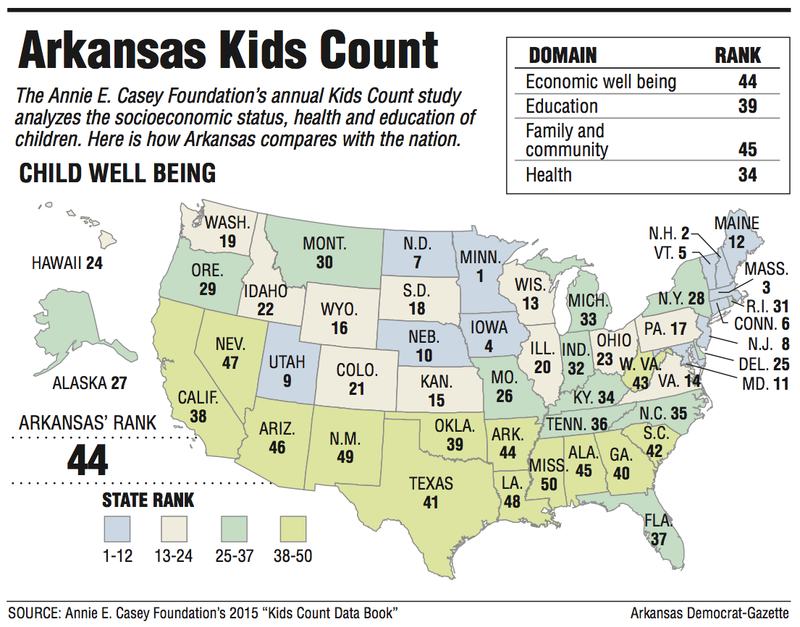Arkansas fell three spots -- from No. 41 to No. 44 -- in the 2015 Kids Count report that ranks each state according to four domains of child well-being: economics, education, health, and family and community environment.
The rankings are based on 2013 data collected from several surveys from various organizations and are compiled by the Baltimore-based Annie E. Casey Foundation.
The five top-ranking states this year were Minnesota, New Hampshire, Massachusetts, Iowa and Vermont. The lowest-ranking were Arizona, Nevada, Louisiana, New Mexico and Mississippi.
Arkansas was one of the five states with the biggest drops in overall ranking from last year.
Rich Huddleston, the executive director at Arkansas Advocates for Children and Families, attributes that drop in ranking to the effects the recent recession had on the state's families.
"The economic recovery is leaving behind a lot of people in Arkansas," he said. "The data shows that there are way too many kids living in families with income that has stagnated."
Twenty-nine percent of Arkansan children, or 202,000 of them, were in families below the poverty line, a jump of 4 percentage points from 2008, when the U.S. economy was in the midst of the recession.
About 22 percent of the nation's children -- about 16 million -- live in poverty, according to the report. That's also worsened from 2008, when about 18 percent, or about 13 million, of the nation's 74 million children lived in poverty.
Patrick McCarthy, president and CEO of the Casey Foundation, said that though the nation has seen an increase in employment in recent years, many of the jobs are low-wage and cannot fully support families.
"Although we are several years past the end of the recession, millions of families still have not benefited from the economic recovery."
The percentage of children in Arkansas whose parents lack secure employment -- defined as full-time, year-round work -- also rose from 32 percent, or about 226,000 children, in 2008 to 34 percent, or about 245,000 children, in 2013.
Fifty-five percent, or 44,000, of the state's preschool-age children are not attending a pre-kindergarten program, according to the Kids Count Data Book. Though that's a rise of 3 percentage points since 2008, it's just 1 percentage point above the national percentage of 54 percent, or 4.4.million preschool children, of the nation's preschool-age children not attending pre-K programs.
"The research is really clear that if low-income, at-risk kids enter kindergarten with learning levels below their peers, they will be less likely to catch up," McCarthy said. "Preschool is a long-term investment."
The state ranked best in health with a ranking of 34 and improved in all four factors taken into consideration: low-birth-weight babies, children without health insurance, child and teen deaths, and teen drug or alcohol abuse.
Though the state still has a higher percentage of low-birth-weight babies at 8.8 percent, or 3,312 babies, compared with the 8 percent national average, or about 315,000 low-birth-weight babies, the state number dropped slightly since 2008. Arkansas also saw improvement in the number of child and teen deaths, the percentage of teens who abuse alcohol and drugs and the number of teen births per 1,000.
Huddleston said he was pleased to see that only 6 percent of Arkansas children, or 39,000, did not have health insurance in 2013. Though that percentage is comparable to the 7 percent without coverage nationally, or about 5.2 million, Huddleston said it's proof that state efforts have been successful.
"We have, as a state, made a very concerted effort on kids' health going back to the late '90s," Huddleston said, attributing much of the progress to the state's Medicaid program for children, ARKids First, and adding that the state needs to continue to prioritize children's health insurance.
"We need to make sure we don't do anything that would make the state take a step backward," he said.
Laura Speer, associate director for policy reform and advocacy for the Annie E. Casey Foundation, said more policies should be put in place to help children living in poverty, particularly children who are members of minority groups and are disproportionately affected.
"Today, as the economy recovers, we see a widening gap between the living standards of many children of color and other kids. The good news is when we've invested in the right strategies and polices -- like ARKids First in Arkansas -- we have made a difference for kids."
The Casey Foundation makes recommendations to "make good on the American promise of opportunity for all children."
As outlined in a news release, the foundation proposes three "critical" strategies: provide parents with multiple pathways to jobs and financial stability, ensure access to early-childhood education and equip parents to become advocates for their children.
"It's going to take a two-generation strategy," Huddleston said. "In order to put children in a better position, we can't leave out the parents."
If Arkansas is to improve in the rankings in future years, the state is "going to have to address the economic factors," he said. "We need more and better paying jobs, like many other places across the nation. It doesn't take a rocket scientist to figure that."
Huddleston said that among other changes, he would like to see Arkansas adopt a family-leave policy and continue an effort to improve access to quality early education, particularity for low-income families.
"If you want to put the state in a position to compete, you have to have a healthy and educated work force to do that," Huddleston said. "It's certainly not going to happen overnight. But these numbers show we have to do something."
Metro on 07/21/2015
